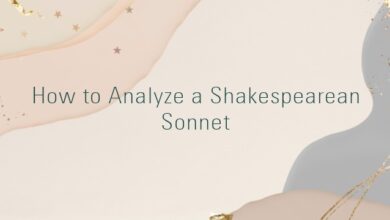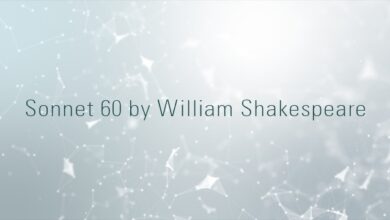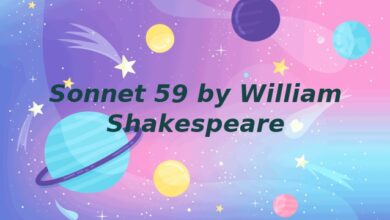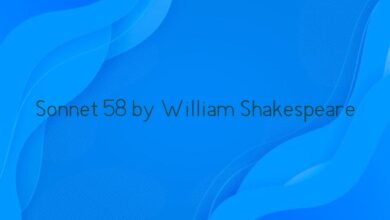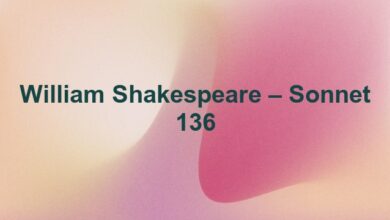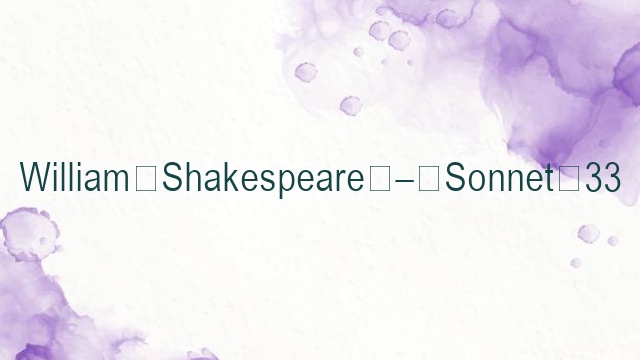
William Shakespeare – Sonnet 33
Full many a glorious morning have I seen
Flatter the mountain tops with sovereign eye,
Kissing with golden face the meadows green,
Gilding pale streams with heavenly alchemy;
Anon permit the basest clouds to ride
With ugly rack on his celestial face,
And from the forlorn world his visage hide,
Stealing unseen to west with this disgrace:
Even so my sun one early morn did shine,
With all triumphant splendour on my brow;
But out, alack, he was but one hour mine,
The region cloud hath mask’d him from me now.
Yet him for this my love no whit disdaineth;
Suns of the world may stain when heaven’s sun staineth.
A sonnet that hardly needs an introduction. This and the following record a rejection by the youth of the poet. How serious or real this was we have no means of knowing. Perhaps it is an imaginary interlude in the sonnet sequence. Most readers however take it as having autobiographical content, and that approach is given credence by what appears to be the genuineness of the sorrow, and by the fact that the episode of estrangement, whatever caused it, is dealt with in this and the following three sonnets.
The fact that we are more disposed to believe in the biographical truth of the sonnet because of its beauty of imagery and language is a reality of human nature which cannot be easily dispensed with. It would be disapponting to learn that the youth and the poet’s impassioned love for him were mere creations of an idle brain, with deliberate intent to lay a false trail and make truth out of fiction. For while we may allow that a Macbeth and a Hamlet are engendered in the heat of artistic creation, their existence gives us a vicarious experience which is not harmed by their fictional reality. I am not convinced that this is so with the sonnets, for we long to trust their sincerity, and to see what it teaches us of our own capacity for love, what it explores and what it defines. Therefore I always assume what I take to be the standard or Wordsworthian approach (pace Browning), that this is a true record of love, no doubt edited and embellished, (for who could ever be word perfect in such matters?).
But we have to acknowledge also that the lover’s frown and her (in this case his) overcast brow, like the sun clouding over on a fine morning, was also a part of the sonnet tradition. Shakespeare was here making use of that rich tradition, as well as recording in his own inimitable way the feelings of one so cast down by his beloved’s disdain.
The 1609 Quarto Version
FVll many a glorious morning haue I ſeene,
Flatter the mountaine tops with ſoueraine eie,
Kiſſing with golden face the meddowes greene;
Guilding pale ſtreames with heauenly alcumy:
Anon permit the baſeſt cloudes to ride,
With ougly rack on his celeſtiall face,
And from the for-lorne world his viſage hide
Stealing un’eene to weſt with this diſgrace:
Euen ſo my Sunne one early morne did ſhine,
With all triumphant ſplendor on my brow,
But out alack,he was but one houre mine,
The region cloude hath mask’d him from me now.
Yet him for this,my loue no whit diſdaineth,
Suns of the world may ſtaine,whë heauens ſun ſtainteh.
Commentary
1. Full many a glorious morning have I seenFull many = very many.
2. Flatter the mountain tops with sovereign eye,Flatter – also has the meaning to stroke. In its normal sense it conveys the idea of insincerity and deception, and ultimate disillusionment. Hence the morning sun was making the mountains appear more brilliant than they in fact were.
sovereign eye = majestic, kingly gaze. Note that here the usual flattery of king by subject has been reversed. The king flatters his courtiers, the mountains.3. Kissing with golden face the meadows green,
The sun kisses the earth. The glorious morning is partly subsumed into the character of the sun, as a result of sovereign eye and kissing.4. Gilding pale streams with heavenly alchemy;
There are echoes in these opening lines from Sidney’s Arcadia: But indeed, as we can better consider the sun’s beauty by marking how he gilds these waters and mountains than by looking upon his own face, too glorious for our weak eyes, so it may be our conceits (not able to bear her sun staining excellency) will better weigh it by her works upon some meaner subject employed. ARC.1.1. (Peng.p.63.)5. Anon permit the basest clouds to rideAnon = very soon, almost immediately;
permit – the subject is morning line 1, and, by implication, the sky and the sun.
basest = blackest, dirtiest, of humble origin; low born. Cf. Edmund in King Lear:
…Why brand they us
With base? with baseness? bastardy? base, base? I.2.9-10.
There is also a contrast with gilding and alchemy. Base metals were the ugly materials of the alchemist’s study, which were destined to be turned into gold, the noblest metal of all.
to ride – as horsemen. The clouds ride on the face of heaven as horsemen ride on the face of the earth.6. With ugly rack on his celestial face,rack = a line or procession of moving clouds; thin, flying, broken clouds, or any portion of floating vapor in the sky.(Webster’s) The winds in the upper region, which move the clouds above, which we call the rack, . . . pass without noise. Bacon.
his = the sun’s, the sky’s, the morning’s.7. And from the forlorn world his visage hide,the forlorn world – the world becomes forlorn, presumably because it is darkened by the ugly rack of clouds, which hide the sun’s celestial face (visage).8. Stealing unseen to west with this disgrace:Stealing = moving furtively, stealthily, like a thief.
with this disgrace = with the disgrace of having his visage blotted out. disgrace could also refer to physical disfigurement.9. Even so my sun one early morn did shine,my sun = the youth whom I love; you; the heavenly eye of my life. This is however the first mention of sun in the sonnet.10. With all triumphant splendour on my brow;all triumphant splendour = gloriously arrayed, in total splendour. triumph conveys the idea of a triumphal procession, a procession to commemorate the victory of a famous commander.
on my brow = upon my forehead, upon my face.11. But out, alack, he was but one hour mine,But, out, alack – editors gloss this as being an emphatic way of saying ‘Alas’, out being an intensifier, and cognate with its use in expressions such as ‘out upon it!’. However I think it also has reference here to the sun, which was only ‘out’, i.e. shining, for one hour.
he was but one hour mine = I enjoyed his (the sun’s, my love’s) presence for only one hour.12. The region cloud hath mask’d him from me now.The region = the upper air, the upper region of the sky.
him = my love, (the sun).13. Yet him for this my love no whit disdaineth;him….my love – these cannot both refer to the youth. If my love = the youth, then him must be the sun of 5-8 and 9-12, which has been disgraced by clouds ruining his face. But if him refers to the youth, then my love is ‘my love for him’, personified, which does not disdain him (the youth) for having become inaccessible.
no whit = not in the least, not a jot.14. Suns of the world may stain when heaven’s sun staineth.
The homophonic meaning, sons, is played upon. Sons of the flesh are also liable to blemish and disgrace, as heavenly suns are. stain can be used transitively or intransitively, so that the youth, as well as becoming stained himself, has passed the infection on to others.

